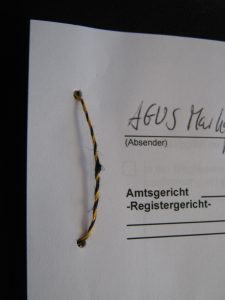Warning: this post is both too long and not exhaustive!
Query in a translators’ mailing list: is it OK to translate German ‘ff.’ as ‘et seq.’?
I would say: probably leave ff., which is less stuffy, but if it’s in a list of statute sections, you can use et seq.
In my usage, one might quote a statute writing ‘Article 31 et seq.’, this being a specifically legal context. But in quoting pages from a book, even a law book, the choice would be ‘pp. 60 ff.’
Here’s a Google search of the UK statute law database:
“et seq” site:www.legislation.gov.uk
It gets 237 ghits.
This at least shows that the term is used in the UK (one colleague thought it might be mainly US).
Notes on this:
ff. in German stands for folgende.
ff. in English stands for and the following.
Germans often think ‘ff.’ is a Germanism and the translator doesn’t know what they are doing.
et seq. stands for et sequens
et seqq. seems sometimes to be used in US English for et sequentes (no ghits at UK statute database)
There are some variations here depending on what style guide you use.
You may omit the full stop (period) consistently.
For example, is there a leading space before ff.? Always, in my opinion, but the Chicago Style Manual says never, and so does Judith Butcher, and this is repeated by some sources on the Web.
‘Et seq.’ is used in strictly legal texts but is getting a bit old-fashioned.
The following is a collection of random remarks:
If you translate a lot of bibliographies, you will have to decide how to write page references in English.
DE S. 41 f. EN pp. 41 f. / pp. 41-42 / 41-42
DE S. 41 ff. EN pp. 41 ff. / 41 ff.
all with or without leading space or full stop or ‘p.’ or ‘pp.’
In citing statutes, whether using ff. or et seq., you can decide what to do with the German §§
US English uses § for section. If German uses two §§, do you use singular or plural in English?
DE §§ 3-4 Br EN section 3 – 4 / sections 3 – 4 US EN § 3 – 4 /§§ 3 – 4
Both are encountered.
What style guides are there, especially for legal English?
For British usage, OSCOLA (the Oxford Standard for Citation Of Legal Authorities) is the way to go. The website also has a section on the 2006 materials on citing international law (not foreign law), which was not dealt with in the 2012 edition. You can download the whole 2012 and 2006 editions, or order the book in spiral binding – may even be available second-hand. However, OSCOLA does not answer the current questions!
Past entries on guides Style guides and law review, The Times Online Style Guide now no longer online but a Google search leads to the wayback machine (web.archive.org), and more.
General English style guides vary in their approach. For the UK, New Hart’s Rules (OUP) and the New Oxford Dictionary for Writers and Editors are commonly used. New Hart’s Rules contains a section on Law and legal references that is welcome, but does not deal with et seq. Another useful reference is Copy Editing by Judith Butcher (who died this year). I have not got the latest edition. She writes:
f., ff., et seq.: ‘pp. 95f.’ means p. 95 and the following page; ‘pp. 95 ff.’ or ‘pp. 95 et seq.’ means p. 05 and an unspecified number of following pages; so do not make f. and ff. ‘consistent’. ff. is preferable to et seq., but a pair of page numbers is better. Remember that in all these cases one should use pp., not. p.
Et seq. is italicized here. Of course, translators can’t give a pair of page numbers if the original doesn’t, except in the case of ‘p. 95 f.’ where it must be ‘ pp. 95-96’.
I won’t have exhausted the UK resources, as a number of newspapers and journals have style guides. Nor have I had the MRA style guide since I wrote my thesis.
One US resource is The Bluebook: A Uniform System of Citation. I think this varies from edition to edition; I have the seventeen
th. It merely prohibits the use of ‘et seq.’, preferring precise page numbers. Not much help to us translators. Then there is the ALWD Citation Manual. A Professional System of Citation, of which I have the second edition. This leads to the same result: if you look up et seq. in the index, it refers to a paragraph citing specific page numbers. Garner’s Dictionary of Usage says the same, althogh it adds, unhelpfully:
Hence the phrase et seq. (short for et sequentes = the following ones) should be used sparingly if at all. The problem is exacerbated by the fact that et seq. serves also as the abbreviation for the singular et sequens (= and the following one), though presumably few users of the phrase know that.
Black’s Law Dictionary adds nothing.
There is quite a useful discussion of the translator’s dilemma here on LEO.
Finally, there is an interesting New Zealand Law Style Guide online, worth looking at for ideas, and it has an accompanying blog.





